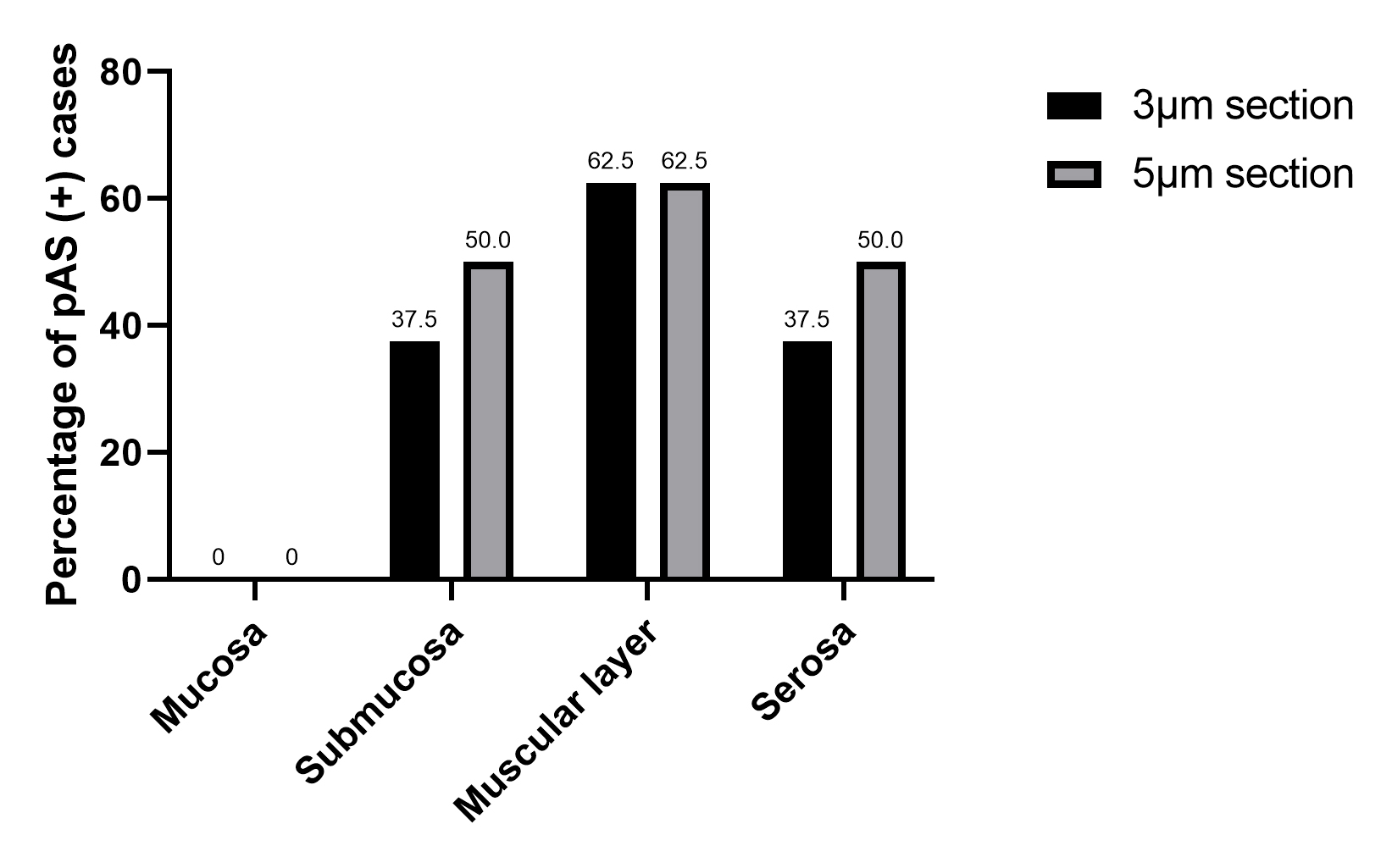Objective: To examine the phosphorylated alpha-synuclein (pAS) immunohistochemistry of the upper gastrointestinal (GI) tract tissue as a “prodromal” pathologic biomarker for synucleinopathy in idiopathic rapid eye movement behavior disorder (iRBD).
Background: Growing evidences have suggested that AS accumulation in GI tract would be used as a pathologic biomarker for Parkinson’s disease (PD). iRBD is considered as a prodromal synucleinopathy. Previously, only one study reported that AS accumulation in the GI tract is present in the iRBD population. In addition, there is a concern that pAS positive rate would be affected by different immunostaining methods. An international collaborative study suggested a putative staining method with the best accuracy for evaluating pAS accumulation in the GI tract.
Method: Eligible subjects were eight polysomnography-confirmed iRBD patients who had a radical operation in the upper GI tract. Eight age, sex, and operation site-matched normal controls were selected. Two immunostaining methods (Method 1: suggested by the international collaborative study, Method 2: used in our previous study) were used on 4 and 3-μm sections, respectively. When two pAS staining methods showed discordant results, adjacent 5-μm sections of GI and brain of a positive control patient, mounted on one slide together, were stained with each antibody in order to examine the staining quality and confirm the positive finding.
Results: Method 1 showed no positive findings in both groups. Method 2 showed positive findings in 5/8 (62.5%) of iRBD patients, but none in controls (p=0.026). Positive results by the layers of the gut wall in 3-μm sections were 0%, 37.5%, 62.5%, and 37.5% in the mucosa, submucosa, muscular layer, and serosa, respectively. pAS positivity was higher in 5 μm sections (0%, 50%, 62.5%, and 50%).
Conclusion: The pAS immunostaining in full-depth upper GI tissue showed high specificity and modest sensitivity. However, endoscopic biopsies may not show such modest sensitivity given that the biopsied tissue is mainly mucosa where there was no positivity in this study. Our study also emphasizes that consensus on the immunostaining method for GI synucleinopathy needs validation by different research groups.
References: Sprenger FS, Stefanova N, Gelpi E, Seppi K, Navarro-Otano J, Offner F, et al. Enteric nervous system alpha-synuclein immunoreactivity in idiopathic REM sleep behavior disorder. Neurology. 2015;85(20):1761-8. Beach TG, Corbille AG, Letournel F, Kordower JH, Kremer T, Munoz DG, et al. Multicenter Assessment of Immunohistochemical Methods for Pathological Alpha-Synuclein in Sigmoid Colon of Autopsied Parkinson’s Disease and Control Subjects. Journal of Parkinson’s disease. 2016;6(4):761-70. Shin C, Park SH, Yun JY, Shin JH, Yang HK, Lee HJ, et al. Fundamental limit of alpha-synuclein pathology in gastrointestinal biopsy as a pathologic biomarker of Parkinson’s disease: Comparison with surgical specimens. Parkinsonism & related disorders. 2017;44:73-8. Shin C, Park SH, Yun JY, Shin JH, Yang HK, Lee HJ, et al. Alpha-synuclein staining in non-neural structures of the gastrointestinal tract is non-specific in Parkinson disease. Parkinsonism & related disorders. 2018;55:15-7 *This abstract is supposed to be presented as a poster in the ADPD meeting 2020, Vienna (date: 02-03/April/2020). However, the presenter may not be able to attend the ADPD meeting because of COVID-19 situation in Republic of Korea.
To cite this abstract in AMA style:
C. Shin, S. Park, H. Yang, H. Kim, B. Jeon. Lack of sensitivity of full-depth upper gastrointestinal specimens as a prodromal biomarker for synucleinopathy in idiopathic REM sleep behavior disorder [abstract]. Mov Disord. 2020; 35 (suppl 1). https://www.mdsabstracts.org/abstract/lack-of-sensitivity-of-full-depth-upper-gastrointestinal-specimens-as-a-prodromal-biomarker-for-synucleinopathy-in-idiopathic-rem-sleep-behavior-disorder/. Accessed April 21, 2025.« Back to MDS Virtual Congress 2020
MDS Abstracts - https://www.mdsabstracts.org/abstract/lack-of-sensitivity-of-full-depth-upper-gastrointestinal-specimens-as-a-prodromal-biomarker-for-synucleinopathy-in-idiopathic-rem-sleep-behavior-disorder/

